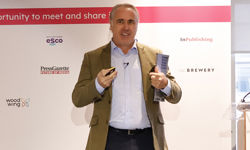First of all, and given the magazine in which this article appears (and its readership), I should add a caveat to that standfirst. I’m not saying magazine subscriptions aren’t valuable, wonderful, life-enriching things. They are. I have many myself. But consult a diagram of Abraham Maslow’s hierarchy of human needs and you won’t find them listed. Nor, for that matter, will you find Ferrari 458 Italias, Louboutin slingbacks or hi-def 42” plasma TVs. But people buy them. And why do they buy them? Because they want them. Desire them. Crave them. In other words, they let their emotions drive their behaviour. Which is all good news for copywriters.
Our job would be immensely harder if people used their reason to inform their buying decisions instead of their emotions. Who, using purely the power of their intellect, would buy a 30-year old classic Rover (derelict) then spend a five-figure sum having it refurbished to showroom standard, so they could use it as a daily runabout? Er … (whispers, blushing) … that would be me. Who, building their argument on a solid foundation of analytical thinking, would spend a month’s salary on a handmade bicycle (as a friend of mine did)? And who, following the dictates of reason, would smoke, drink, party till late, eat fatty food and drive over the speed limit? OK, OK, stand in line at the back there.
Not everyone believes that human beings are driven by their emotions. Large swathes of the voluntary sector believe the opposite. They assume that because the arguments for relieving famine in Africa, cutting CO2 emissions in the West or preserving native English birds are so persuasive in themselves, all you need to do is batter your reader over the head with sufficient facts and they will open their wallets. But it turns out that facts alone have the same effect on wallets as a stiff wind does on an old man’s overcoat. However, turn on the warmth of emotional copywriting and you find the wallet opens, much like the overcoat.
The need to belong
Let’s whizz back down the time tunnel and take a look at pioneering copywriter Claude C Hopkins. Among his many achievements, he did wonders for the sales of Listerine mouthwash. How? By inventing a pseudo-scientific word – halitosis – and then making people worried that they had it. That worry went pretty deep, as it fuelled fears of social ostracism. Now that is one of the explicit needs in Maslow’s hierarchy: the need to belong. Human beings are herd animals. We need to be part of a group. It’s important for our sense of security and of self. That’s a good place to bring in a simple emotional copywriting technique.
In a sales letter, email or ad for a magazine, you will often see the word ‘subscribe’ as the call to action. But ‘subscribe’ is a publishing word. Our readers would far rather join a group than subscribe to a magazine. Don’t get me wrong, we still want their £22.97 a quarter by Direct Debit, it’s just that asking them to join a like-minded group of scrapbookers, finance directors, petrol heads or caravanners will carry a stronger emotional punch than asking them to subscribe to a magazine.
In his book Influence: The Psychology of Persuasion, Robert Cialdini, Regents' Professor Emeritus of Psychology and Marketing at Arizona State University, identifies what he calls the “six weapons of influence”. Each one describes a method for encouraging a punter to go along with what Cialdini calls a “compliance professional”, and I will call a salesperson. Each one, also, relies almost entirely on emotion to do its work. For example, “Liking” asserts that people are more likely to comply with someone whom they like. So far, so obvious. And what makes us like someone? Well, such rational things as, they are like us, they are physically attractive, they flatter us or they make us laugh. Flattery is an easy technique to pull off in copy too. As a way to open a letter it has few equals (an appeal to greed runs it pretty close). You might say something like this, for a cooking magazine for example:
Dear Mrs Beeton,
If you are anything like the other expert chefs I talk to, you can’t abide waste in your kitchen.
Or, for a men’s lifestyle title, perhaps this:
Dear Mr Beckham,
My research tells me you are the sort of man who is never satisfied with second best.
Ethos, pathos and logos
Moving back in time beyond either Cialdini or Hopkins, let’s turn to the Ancient Greeks, specifically Aristotle, for some thoughts on the power of emotion. He formulated what modern business school theorists would no doubt call a three-point strategy for effective oral communications. To be a compelling speaker, he advised the use of three components: ethos, pathos and logos. Ethos refers to the speaker’s character. In other words, why we should trust them (and their words). Pathos referred to the emotional content of their message. And only logos – the argument itself, the words – referred purely to reason and intellect.
Aristotle’s EPL Model, as I will henceforth call it, is a great little framework for fashioning any type of commercial message today, and it works especially well in subscriptions copywriting. Here’s a little passage to show you what I mean, for the fictional magazine (though I would subscribe like a shot if anyone out there feels like launching it): The Loaf.
Dear Ms Jones,
You and I share a love of baking. We know the feeling of pride as the dough rises to perfection overnight in the chill of our pantry.
So I am writing to invite you to join me at The Loaf.
Every month I will share with you some of my secrets for perfect loaves, rolls, morning goods and pastries ... at least 25 new recipes every issue ... reviews of the latest bakery equipment for home use ... plus video interviews with the world’s great bakers, blogs, e-newsletters and a forum for home bakers to share ideas and recipes.
Why am I doing this?
Well, since I launched my bakery business 20 years ago I have been called on by many of the world’s most successful restaurateurs to supply their bread. But I turn down three in every four because they can’t assure me they will keep my bread in the right conditions.
Now I am turning my hand to this new magazine for those, like you and me, who love baking their own bread.
But what about some more general tips for emotional copywriting? Here’s a story. Last year, one of my assignments was to help a major UK charity write more emotionally compelling copy. We got into a whole debate about the difference between emotive copy and emotional copy. You can sum up the difference like this: emotive copy means pouring out your own feelings, emotional copy draws them out of your reader. Now, guess which one brings in more money? For my client, the picture was further complicated by a recent and ongoing brand tune-up. They wanted to move from a writing style hobbled by a need for scientific rigour at all costs to one that would engage their donors, members, supporters and funders more emotionally. The new brand guidelines veered dangerously close to self-parody, as in the deathless passage that urged staff to get over-excited: “Well, animals are amazing. You know it’s true! Don’t you? Don’t you?”
Once I’d finished my rant that “exciting”, “fantastic” and “brilliant” were no good (and this is a good tip for magazine publishers who imagine these adjectives pep up a saving of £7.67 a year), one writer stuck her hand up and asked, “Well, how do we put emotion across then?” Which is a fair question. Except that it starts from a false premise. Which is that your reader is interested in reading about your emotions in the first place. Now, if you're David Attenborough, Lady Gaga or Usain Bolt, maybe your fans do want to know how you're feeling. Tweet away to your heart’s content. But we aren’t them. We’re people writing to ask for money. The question we decided it was legitimate to ask is, “How do we get the reader to experience the emotion I feel?” And the answer is this…
You must describe people, magazines, landscapes, hobbies, business problems or whatever you’re writing about in such detail that the reader feels they are there. In an exercise I set during the workshop, every single member of the group produced a piece of copywriting that evoked emotion. None emoted. Not one. There were quiet little gasps of pleasure at some of the best pieces, but all succeeded. We decided that the tone of voice can be neutral, dispassionate even, provided the imagery, storytelling and linguistic richness are there.
If benefits are the engine of a sale, emotions are the fuel. But there’s no point pumping in low-grade gas. You need the high-octane stuff. The expensive stuff. The stuff that you drag up from deep underground through sheer effort. So forget about adjectives and adverbs, the experienced copywriter advised sternly. Forget about fantastic, unique superlatives. Focus instead on a precise evocation of the world you want to create in your reader’s mind.










